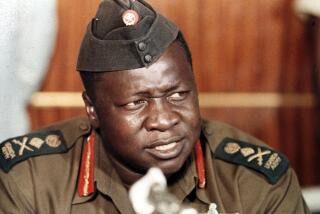African Peacemaker Needs Self-Healing
- Share via
There is great irony in the efforts of the Nigerian government to restore democracy in Sierra Leone, after the military coup May 25 that dislodged the 15-month-old administration of President Ahmad Tejan Kabbah.
Anyone knowing the troubled course of the present government in Nigeria will not be unaware of this ambiguity. Gen. Sani Abacha came to power in 1994 by overthrowing a transitional government that had been hurriedly instituted by Gen. Ibrahim Babaginda, Nigeria’s head of state from 1985 to 1994. That government was itself a kangaroo arrangement brought about by the fierce pro-democracy rebellion that followed the annulment of a free and fair democratic election held in June 1993. Nigerians had thought, most naively, that Abacha would reverse the annulment and thereby save the country from the danger of a second civil war in 34 years.
Instead, the Abacha administration settled down to power and perquisites and began to inflict arbitrary punishments on civil society and the democratic opposition. Abacha’s government has introduced decrees that make it possible for its officials to detain or imprison anyone indefinitely without judicial intervention. In the past three years, labor leaders, pro-democracy activists and journalists have been imprisoned on the strength of these decrees. Four journalists are serving 15-year sentences. The winner of the 1993 elections, Chief Moshood Abiola, has been in detention since 1994. Two former military leaders turned democrats, Gen. Olusegun Obasanjo and Shehu Yar Adua, are also imprisoned. In 1994, the newspaper I work for, the Guardian, and two other newspaper houses, Punch and Concord Group, were shut down for a year. Upon our return to the newsstands in October 1995, security operatives routinely visited our offices to complain about certain stories, with the not-so-subtle threat that we could be “disciplined” again if we failed to stop “attacking” the administration.
Although there supposedly is a transition to democracy program in Nigeria, set to be concluded in 1998, oppostion members have insisted on validation of the June 1993 election, and are alienated from the process. Wole Soyinka, Nigeria’s Nobel laureate in literature who has been in the forefront of the pro-democracy campaign, has been charged with treason. Now living abroad in exile, he faces a death sentence, as did another Nigerian writer, Ken Saro-Wiwa and eight other members of the Ogoni ethnic group who were hanged in November 1995.
It is this same administration that has been preaching the gospel of democracy most eloquently in West Africa. Abacha’s administration has succeeded, through leadership of the regional peacekeeping force, ECOMOG (the Economic Community of West African States Monitoring Group), in bringing about peace in Liberia, helping Liberians return to democratic rule. In Sierra Leone, Abacha has been quoted as saying soldiers have no business running a country. For the Nigerian leadership, it appears that democracy is most attractive only from a distance.
There is nonetheless a positive aspect to Nigeria’s intervention. When Warren Christopher, former U.S. secretary of state, visited Africa last November, he suggested the formation of an African regional peacekeeping force to respond to emergencies on the continent, and thus end dependence on Western intervention. The suggestion was ignored, even by South Africa’s Nelson Mandela, whose support Christopher had expected. Now, Nigeria’s leadership role in ECOMOG and its interventions in Liberia and Sierra Leone is sure proof that African nations can indeed be effective in solving African problems. For showing this, the Nigerian leadership has earned credit. Both the Organization of African Unity and the British Commonwealth, which until now has isolated Nigeria for human rights abuses, have praised the country’s efforts.
Still, the Nigerian government raises moral questions about its commitment to democratic ideals. If it is so concerned about democracy in the West African subregion, it should begin by promoting and tolerating democratic values at home. Its prisons holding journalists and opposition figures should be emptied. The Nigerian government should live up to its protestations that military rule is unfashionable.
Beyond Nigeria, the Abacha administration has set a precedent and provided a moral basis for outside intervention--something that the next group of soldiers deciding to seize power anywhere in West Africa will have to consider.
More to Read
Sign up for Essential California
The most important California stories and recommendations in your inbox every morning.
You may occasionally receive promotional content from the Los Angeles Times.













